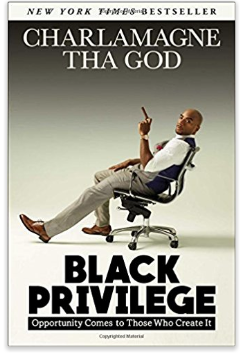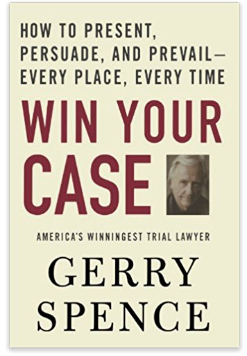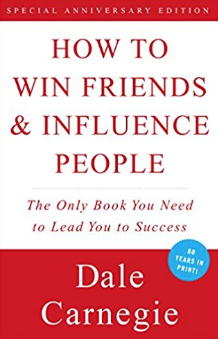I recently read “Black Privilege: Opportunity Comes to Those Who Create It” by Charlamagne Tha God. Below are the quotes I found most interesting. If you like them, buy the book.
 “Opportunity truly does come to those who create it.” (xx)
“Opportunity truly does come to those who create it.” (xx)
“When you stop complaining about where you are physically and start focusing on where you are mentally, that’s when you will start to transcend your circumstances.” (1)
“When I’m stuck, I reconnect with my core. That means getting on a plane to Charleston and then heading straight to Moncks Corner. I will literally drive to my mom’s house and go sleep in my old bedroom.” (30)
“When I can reconnect with the dreams my younger self used to have, whatever little drama or doubt that was getting me down quickly becomes irrelevant.” (30)
“During the cultural revolution in China, wearing glasses often got people killed because they were a symbol of elitism>” (40)
“Fuck your dream (If it’s not really yours.)” (98)
“It’s critical that you be able to tell the difference between someone telling you “Fuck you dreams” in order to get you on the right path or simply telling you “Fuck your dreams” because they’ve already given up on their own.” (105)
“You can talk about all the magazines and blogs you’ve read, or discuss what rappers are dissing each other, but ultimately sharing your own life is what will take you to the next level. Honesty and intimacy is what forges a real connection with the audience.” (132)
“Very few things will center you and recharge your spirit like caring for your child.” (136)
“I don’t keep any personal items in my office. Because you just never know.” (When they might fire you) (141)
“When someone offers to help you, tell them exactly what you want. Don’t beat around the bush. If you’re not crystal clear about what your ask is, chances are you won’t get anything.” (148)
“You can never – even if the situation blows up in your face – hurt yourself by helping others.” (151)
“Success is a process: there are no cheat codes, no life hacks, no shortcuts, and no half steps. Opportunity always comes before money, but sadly a lot of us don’t recognize it unless there’s a paycheck attached. Don’t make that mistake.” (153)
“When you’re just starting out, put yourself in the position to be a part of the process, and THEN get that money.” (153)
“If you want to see a person’s true character, watch how they treat people who seemingly can’t help them.” (153)
“Too often we’re given bad advice on what it takes to get from where we are to where we want to be. We’re taught that the only accurate sign that we’re moving toward success is making money. We get caught up sweating the results instead of embracing the process. Even though embracing the process is the only way you’re ever going to get what you want out of life.” (157)
“Tommy Buns was telling them to slow down and focus on the work in front of them, no matter how small the job might seem, instead of immediately looking forward to the big scores. If they couldn’t even put the weed in the bag first, how were they going to go out and become major players/” (157)
“You’re supposed to be busting your ass for “nothing” when you’re in your twenties. And sometimes even your thirties. That doesn’t mean you’re being exploited. It means you’re building up the skills, connections , and reputation to eventually build a platform on your own.” (160)
“If hard work is the best quality an intern can display, ambition is definitely one of the worst. That doesn’t mean you can’t be ambitious… but I guarantee their employers weren’t too aware of that ambition when they were interning. They all knew how to keep that ambition in check until the time was right” (163)
“In order to be a great intern, you must have blinders on and stay focused on the work that’s in front of you, instead of the work you want to be doing down the road. This is because the program directors, managers, producers, and supervisors don’t care about your dreams. They’re focused on their own. So don’t waste their time making noise about what you want or what your master plan is.” (163)
“Your only value to them is the work you put in. If you’ve handled your internship correctly, when it’s time to move on, your superior should come to you and say, “So, what are you trying to do with your career?” And when you tell them, it should be their first time hearing your plans.” (164)
“I’d rather take less money now if it helps set me up to get more in the long run. I’m focused on creating opportunity for myself, not wring every last penny out of a deal.” (166)
“I asked Paul, “Tell me how people who’ve achieved fame manage to fall off?” “Their attitudes and managers,” he replied. “Bad attitude speaks for itself, But you know, you get these managers that speak for you and they take a bunch of your money and they create drama where there is no need for it,” he told me. “The most dangerous thing they do is gas up the talent. They make you feel like you’re bigger than the company, which you never are. I don’t care how famous you are, or how much press you get, you’re never bigger than the company. And if a manager makes you feel like you are, they’re doing you a great disservice.”” (171)
“Measure your success by the opportunities you’re presented with and the opportunities you’re creating for others. Not the amount of zeroes in your paycheck. When that’s your sole measurement, you’re going to come up short in the end.” (172)
“Being active on social media can amplify the work you’re already doing, but it is not work unto itself.” (174)
“He just had that combination of charisma and work ethic that made him stand out despite his surroundings.” (178)
“Too many radio jocks and writers don’t share their true opinions because they’re more concerned with making friends in the industry than being advocates for their audiences.” (216)
“Opening up was the turning point. Instead of dissing me, they began to root for me. They wanted to walk my journey with me.” (219)
“It’s insane to expect to be further along in life if you’re still acting and thinking the same way that you always have.” (243)
“There are a lot of people whose main talent is their ability to coach.” (262)
Liked the quotes? Buy the book.





